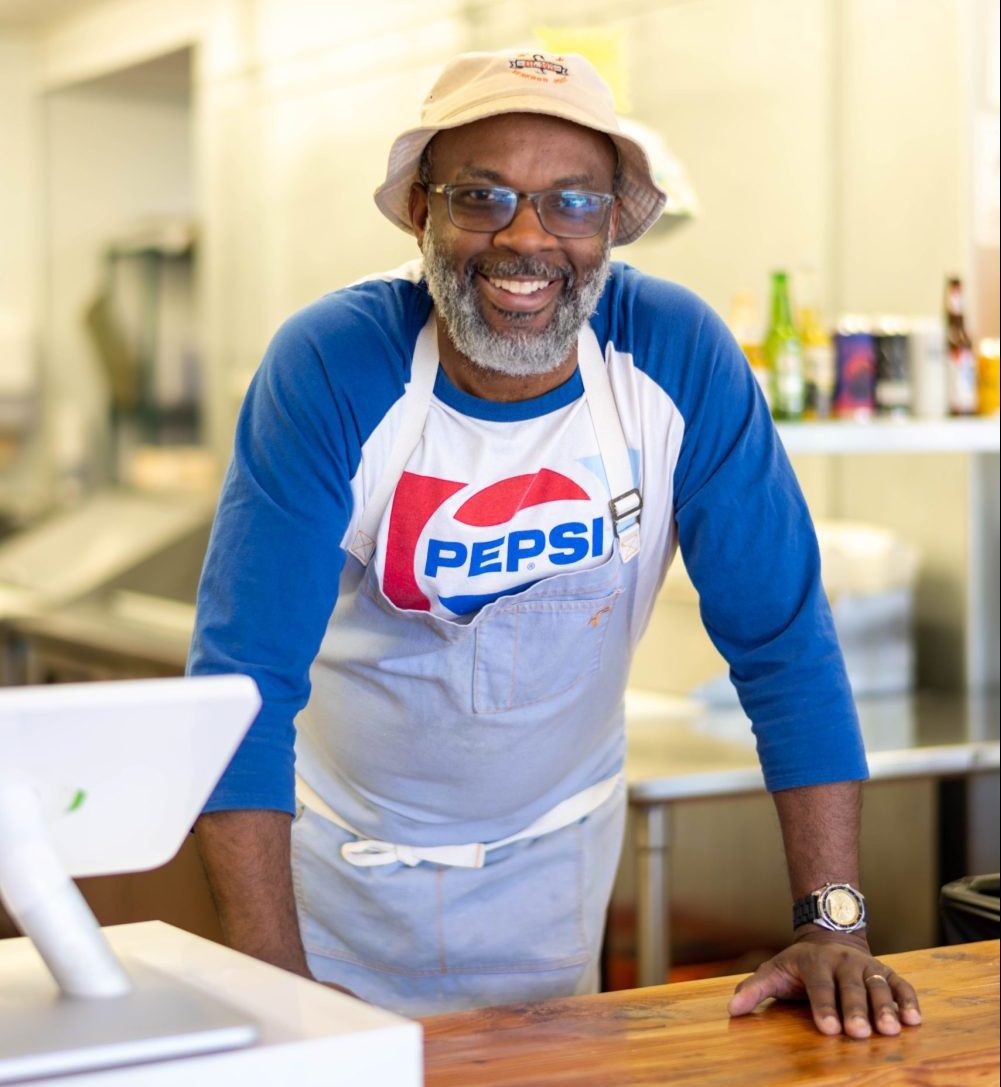On a bright Wednesday morning, I headed toward Saltbox Seafood Joint. The restaurant was founded by Chef Ricky Moore, who was recently named a James Beard Award finalist for best chef in the Southeast.
As I drove down Durham-Chapel Hill Boulevard searching for the restaurant, Saltbox’s logo slowly came up on the horizon above a simple letter board sign stating “NC Seafood.” Then Saltbox presented itself, shaped like a shrimp boat and painted an unexpected pastel green color—modern and fresh, like the restaurant itself.
The restaurant wasn’t open for another hour, but Moore popped his head out and greeted me with a big smile, dressed in a hunter green puffer vest and a bucket hat.
Knotty pine paneling covers the restaurant’s back walls, but we sat in front, where large picture windows take up most of the wall. Moore sat by a small strip of exposed brick, underneath a large poster of his cookbook.
While we chatted, a young woman rode up in her Jeep and eagerly walked towards the locked door, and then went back to her car to wait. Then another eager pair of customers walked up to the restaurant and, seeing that it was still closed, sat down at the orange and sky blue picnic tables with their eyes on the door.
Moore is famous for his trademark hush-honeys and for serving up fresh seasonal seafood. I asked him to tell me about how he came to love seafood.
Vanessa Real Williams: What is your first memory of seafood?
Ricky Moore: First memory is going to be family fish fries. It was a very celebratory thing. I mean, it was plentiful shrimp, oysters, flounder, all these other species. And that was part of the culture, the food culture, from a heritage standpoint.
I also like to share this little tidbit about a rite of passage for the younger members of the family: Whole, bone-in fish was a very adult thing. So in order to position yourself in the family as somebody who has become mature, you were offered a whole fish, i.e. a croaker or spot. It was whole, it wasn’t filleted, and you were there to navigate it. If you got choked, then that’s what it was. But obviously nobody was going to pass out or die or anything, and you learn how to navigate that.
And they would give you some sort of cushiony food product, i.e. white sandwich bread, to help push it down. Some of those fin bones right around the collar are very fine. You think you’re eating real good, and all of a sudden [choking sounds]. So now you were traumatized a bit. And depending upon the individual, it would end your career for eating fish with bones in. But some of us powered through it and pushed on.
A lot of people don’t eat fish because of the trauma. “Oh, man, I got choked. No way, I don’t want a bone around, not one.”
Being in the profession that I’m in, as you move through the craft learning different styles of food, you get to a point where you refer back to your culinary DNA. Some of the best dishes you’ll probably ever eat are dishes that someone grew up eating. They had a reference point, a food memory, and then they brought it forward. For me, I brought those things back up, those memories of eating seafood. So that kind of helped to ignite Saltbox.
I could have done a ton of things, okay? But my original location, it just felt like a little roadside fish joint going towards the beach, where I’m from.
Williams: Did you eat a lot of seafood growing up?
Moore: No, we were traveling in the military. As an army brat, you go everywhere. And some places were not about seafood. I would say I grew up eating country cooking.
So just like, when you go to France. How many metropolitans are in France? Only one, and that’s Paris. Everything else is rural, and it’s country. So a lot of the— a la terroir, a lot of the cuisine— is country food. Now, obviously, there’s chefs who grew up in those regions, and they really celebrate specific ingredients, and then they put it on a sort of haute cuisine level. But at the end of the day, their reference is what their grandmama cooked.
So that’s what we eat, too. My mom learned eastern North Carolina country cooking. And it was comforting when you’re away from home.
Williams: When you first decided to go into the military and pursue cooking how did your family react?
Moore: My father was in the military for 20 years. So, it just felt natural to do it.
I got a scholarship to go to East Carolina University, but I didn’t want to go to college. I wouldn’t have been successful, because of my maturity level. I needed some other activity that would be a bit more hands-on, so I joined the military. Frankly, you get a place to stay, you get clothes, you get allowances, you get a place to eat. I mean, that was the best thing going.
I chose to be a cook in the military. I said, “You know what? I’m gonna try this.”
You had to cook per the recipe. You had to kind of riff on it, make some adjustments here and there. But still the base was there. That’s where I learned the discipline to follow a recipe. You weren’t supposed to do anything outside of that. Because that’s a regulation. It’s an order. The recipe was an order. And if you didn’t do it, you could get disciplinary action for it.
Part of the morale component in the military was, you got people away from home, in battle. What else do they have to motivate them besides a good, hot meal? It was not about slopping some stuff on a plate. Mashed potatoes with good brown gravy, a nice tender, moist meatloaf, green beans, a hot roll made from scratch—I want to be clear about something, we did not open up a bunch of cans.
We were charged as the food service department to make sure that we were providing wholesome meals for soldiers. That was our mission. Every component of the unit has a mission, and our mission was to make sure they got three meals a day, served hot and wholesome, and they get as much as they want. Because a lot of people had nothing else to look forward to but that. That allowed me to think, “Wow, I’m effecting change in my fellow soldiers by doing my part here.”
Williams: How did you learn about your James Beard Award nomination?
Moore: It comes out via Twitter. And, obviously, once that gets put out, then the local news and everybody gets it.
It’s always good to be recognized by your peers. It’s been a wonderful thing to see the diversity that has been showcased. And I’ve been in the business 30 years, and this is just now happening.
So, I had a lot of successes in the business. Sure, you get James Beard nominated, cool, that’s good. I just know that I need to always stay grounded. And my goal is to make sure there’s representation, make sure there’s mentorship, make sure there’s people who want to be in this business now. Because now it’s up to people like me who have seniority in this business to create a space in this industry where people feel comfortable.
But also, it’s a viable career. There’s been a dialogue of it being awful, and not pleasant. When I came into this business, I was really fired up. I wanted to understand the craft of cooking. I’m working hard. I’m working a lot of hours. And any job that you work on requires a lot of hourly activity if you want to be good at it. And a lot of those hours are on your time, that’s the investment in yourself.
I just don’t want the hospitality business to be looked upon as, “Oh, I don’t want to do that. They work too hard!” I know a lot of tech people who work too hard. I know architects who work too hard. So, I just want to be a proponent —don’t mislabel the industry that I love. Even when it was bad, even when it was challenging, when there was nobody recognizing me, I enjoy what I do. And that’s a blessing.
Williams: I will admit, I grew up on an island but don’t eat seafood. What’s a good fish to try getting into seafood?
Moore: I would say go straight to a white, mild, flaky fish, just sort of a neutral taste, not as prominent. You want a nice flounder, or grouper, or white fish. Frankly, a majority of people are like that.
Me? I’m the opposite. I like fish with flavor, which means fish that has more oil in it. “Fishy” is the incorrect term. “Fishy” fish is usually bad. That means the quality is bad. In something rich and oily, like mackerel or mullet, or blue fish, even the flesh is dark. But they’re wonderful to eat.
Now salmon, everybody eats that no problem. But technically, it has the same characteristics in terms of the oil content. We’ve been culturally conditioned from a marketing standpoint to eat salmon. Now if you did the same thing with bluefish, people would be eating more bluefish.
Williams: Is there anything I forgot to ask you?
Moore: North Carolina fisherfolk. Saltbox would not be if it weren’t for the North Carolina fisherfolk. So, I like to celebrate that. I like to let people know that, hey, we got to celebrate North Carolina seafood, we have to celebrate that heritage, we got to celebrate the idea that this is a resource that we have.
And there’s more to eat than flounder, shrimp and oysters. Because typically when you go to a lot of seafood places, that’s what they have. And seafood in general is seasonal. Just like you don’t eat strawberries in the wintertime, same thing with fish. Fish move in schools and they move in seasons. You catch certain things at certain times.
Now people come in and they say, “Oh my God, you don’t have this? You don’t have this?”
No. If I’m living up to my brand promise that I serve North Carolina seafood, then I need to serve it seasonally.
Two Durham establishments are finalists for 2022 James Beard Awards: Ricky Moore for Best Chef, Southeast and Alley 26 for Outstanding Bar Program. Cheetie Kumar of the Raleigh restaurant Garland is also a finalist for Best Chef, Southeast. Winners will be announced June 13.
Above: Chef Ricky Moore of Saltbox Seafood Joint. Photo by Simran Prakash — The 9th Street Journal






